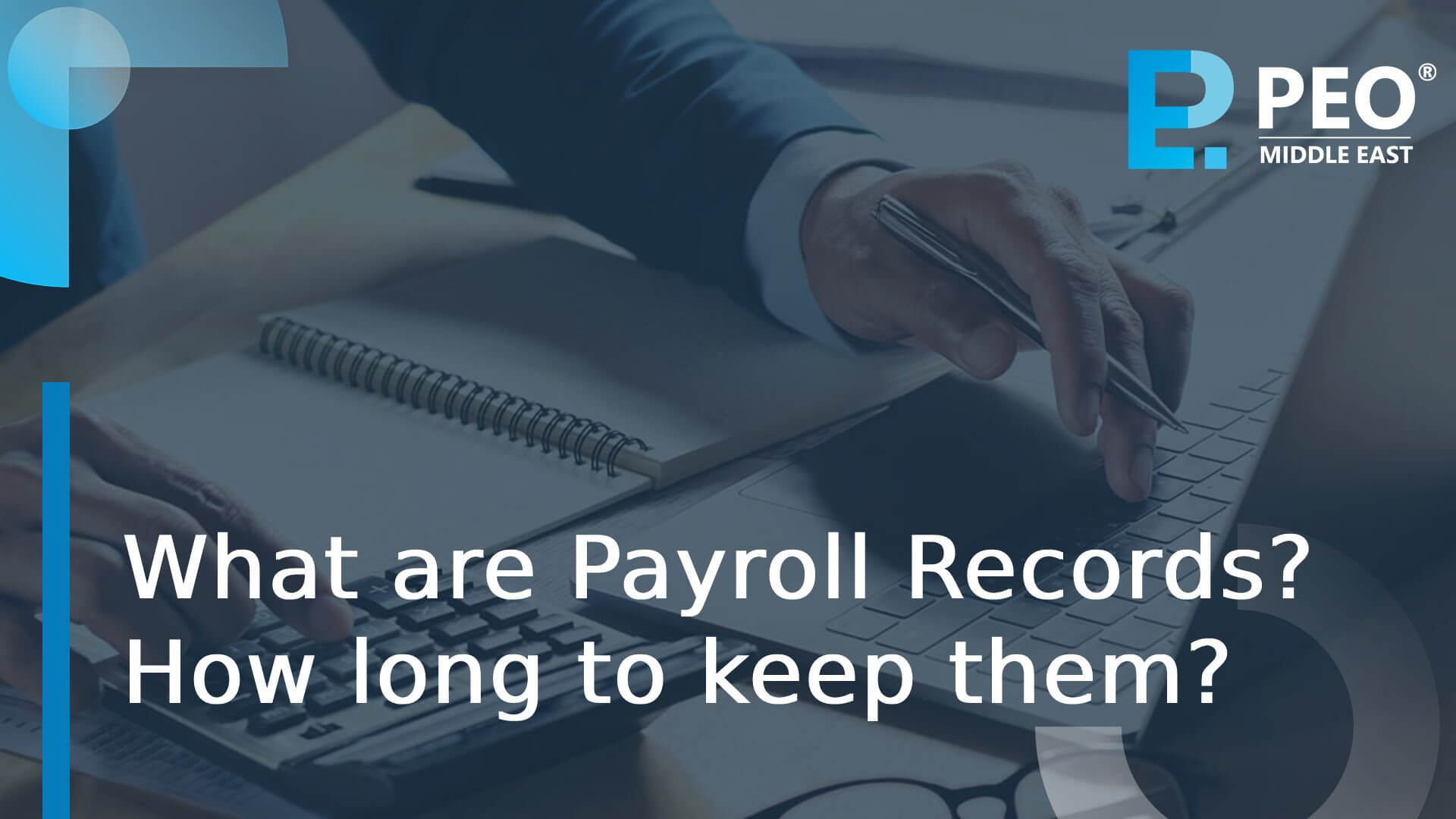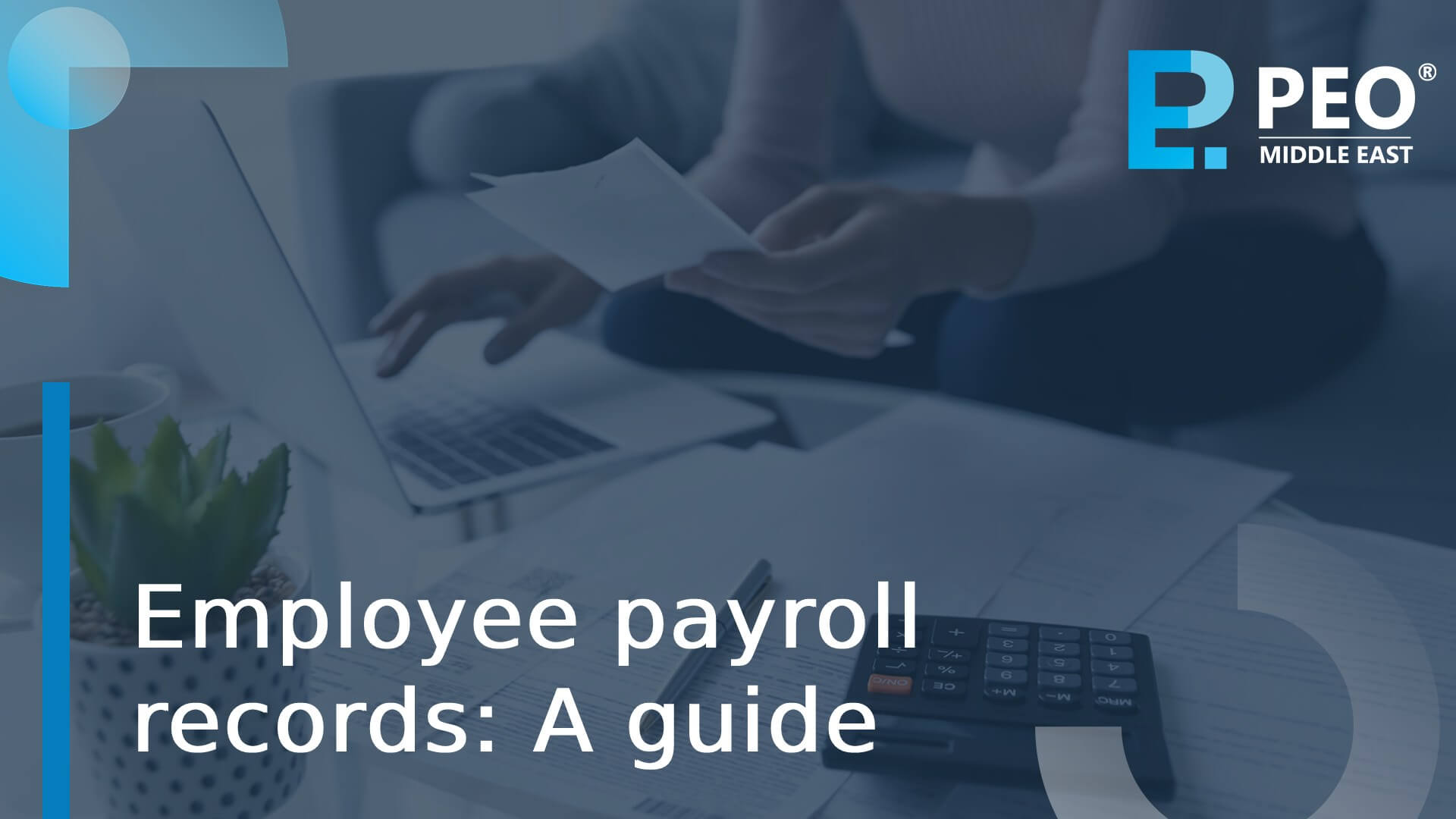Payroll records should be mandatory in your business as they are required by law. These records help you to know the financial aspects of your company in terms of wages. This system brings you benefits that can help you improve your budget, among others.
In this article, we show you each of the aspects related to these records and their storage. In addition, you will know the necessary documents that you must maintain so as not to incur legal faults. Here is every detail:
1. What is a payroll record?
2. What are the common deductions?
3. How can you calculate payroll?
4. Is there any reason to do them?
5. What are the documents that a business should store for this purpose?
6. How long should I keep them?
7. Store payroll records
8. Why should you delete these logs after a certain time?
9. How can we help you with payroll registration and storage?
1. What is a payroll record?

Payroll records are a combination of paper or digital documents that store deductions for a given period. Thanks to this, you can confirm the types of deduction per employee, their amount, and the salary calculation.
In the same way, the deductions referring to the taxes that are subtracted from the gross payment are recorded. These discounts also include the statutory taxes that the company must withhold from the pay of employees. For example, those related to a national health system or a retirement program, among others.
In addition, a business should also consider other deductions that may apply. Some of them are fractions of deposits that the employee places in a savings account or amounts for garnishments. Likewise, the salary advances that the worker has received also count for the deductions.
2. What are the common deductions?
There are two types of deductions that you can make in the salary of employees in UAE, mandatory and voluntary. The former refers to the deductions from the payment for legal obligations. On the other hand, the voluntary ones are those that involve the payment of medical insurance, advances, etc.
The latter is chosen by the employee himself and is in common agreement with the employer. Both types of deductions are detailed below.
2.1 Compulsory deductions
Medical insurance deductions can fall into this category. In addition, they may include payments to courts that have won cases against certain employees. Another important deduction is the one made for late child support.
Likewise, according to the law, the employee will receive deductions in case of:
- Recovery of loans requested by the worker, with the prior consent of the parties.
- Restitution of excess payments, which should not exceed 20% of salary.
- Payments deducted from the calculation of contributions for pensions and insurance.
- Contributions to provident funds by the employee.
- Contributions to social works, privileges, or other services provided by the employer and where the worker commits in writing.
- Debts for infractions committed in the company, must not exceed 5% of salary.
- Payments for damages caused by the worker.
Also, if the employee must contribute multiple deductions, these cannot exceed 50% of their salary.
2.2 Voluntary deductions
In this case, the worker must give authorization so that some of the following aspects can be deducted:
- Health insurance premiums (dental, medical, or vision plans).
- Contributions for flexible expenses.
- Retirement contributions.
- Life insurance premiums.
- Short-term disability plans.
- Donations.
- Purchases between offices.
- Uniforms and tools.
Similarly, the employer legally has to provide a name, date, and reason for the deduction. This will be known to the employee, who must authorize it. This procedure has become a standard in all companies in the region.
Another aspect that must be part of this authorization is the amount of money to be deducted. Likewise, the employer has the option of notifying some more elements within that authorization. One is the amount in the local currency or another preferred by the employee during a set period.
Likewise, the name of the charity or the person who will receive the donation. This can be monetary or uniforms or tools, depending on the number of them. Furthermore, an employer is required by law to make the last payment to the employee before termination of employment.
3. How can you calculate payroll?
This process can be carried out with certain variations, depending on the rules of the company. In addition, can change according to technological solutions or the outsourcing of the procedure with a PEO agency. Next, you can see which are the most important elements:
- Maintain an employee file: The payroll clerk is the one who stores this record. It consists of all the personal and labor data of each worker.
- Salary calculation: The company has to do it each pay period, for each employee.
- Working time: This is a monthly count and should include normal and overtime hours. In this case, it is advisable to use appropriate software to save time.
- Special assignments: This line is also taken monthly and involves aspects such as commissions, bonuses, etc.
- Deductions: As already stated, these can be mandatory or voluntary.
- Salary report: It must contain minute details of it. In addition, you must give each employee a receipt with all the details of their salary.
- WPS Sif File: Used to transfer salary to employee bank accounts.
4. Is there any reason to do them?
There are several reasons why companies do payroll records. Among them are:
- Taxes
One of the main reasons is that, at the time of an audit of the company, these records facilitate the process. In addition, they help the department in charge of the process to prepare adequately to make the tax return to government institutions.
Another point is that thanks to the payroll software designed for this purpose, the employee experience improves. This is because they can easily access their tax data and easily download it.
- Legal reasons
Government entities encourage companies to make payroll records. Likewise, obeying the conditions established by law will prevent your business from incurring legal problems. Under UAE labor law, these will depend on the number of employees registered with a company.
So, not doing this type of registration carries great risks for you and your company. Not only will you break the law but at the time of an audit or lawsuit, you will have no evidence to defend yourself. In this case, you can waste time, money, and effort on it. There are many HR management agencies that can take care of this process to keep your compliance with the law.
- Expenses and proof of employment
In the first case, the records contain information on salaries and taxes, valuable for improving budgets, and expenses. In the same way, they help those employees who need documents to prove that they work in a company. Reasons may vary, including income from assets or applying for loans. It is important to note that with the support of an employment of record you can suffice your payroll with no hassle.
5. What are the documents that a business should store for this purpose?
Many documents must be placed within the payroll records of a company. Some of them are:
- The records must contain the personal information of the worker, this includes names, addresses, telephone number, and email. In addition to any other information that identifies them.
- Another important point is regarding employment as eligibility data if they are a part-time or full-time worker. It also contains the background of previous jobs, evaluations, and references, among others.
- A section including regular work hours, overtime hours, as well as daily and weekly time worked.
- The business also needs to have information on payments made to employees. These include pay arrangements, weekly work start and end dates, payment types, and employee classification.
- Other information to include is the forms of reimbursement for work trips, office supplies, etc.
- Companies must include local and national tax forms, copies of tax returns, as well as withholding.
- Payment records such as the periods when they were made, dates of payment, and types of salary, among others.
- Also, you must include Information on benefit deductions, deferred compensation, and payment orders.
- Other types of documents like those related to payments made for permits granted to employees.
6. How long should I keep them?
Keeping records of any kind in a business is an important matter, even if it is considered tedious. In addition, those in charge of it must do it precisely so as not to make mistakes with legal consequences. In the case of payroll records, these have a specific period to keep them stored.
Records including timesheets, wages, tax deposits, and pension payments, must be kept for 4 years. This is from the time the taxes are due.
However, the recommendation of the experts in the field is to keep the documents for 5 years. This time is sufficient in case of tax audits, lawsuits, or claims. However, you should consult with your lawyers or accountants according to the rules or needs of your company. Also, when you outsource the services of a profesional employer organization, they will make sure to let you know how long should you store these records.
7. Store payroll records
When it comes to saving your business payroll records, there are a few recommendations you should follow. These are where to store it and what method to follow to achieve this properly. You must have a comprehensive backup of all the data that has been recorded.
Physical document storage is not common today, due to the amount of storage required. The small businesses are the ones who use it but even these are changing to technological methods. This is also because the paperwork involves safe storage ideas, like fireproof boxes.
In the case of medium-sized or large companies, they need other storage media. Due to technological advances, they can keep these records digitally, both in the cloud and on external hard drives. The first of these methods is more secure and the payroll service providers use it.
In addition, you can use software that alleviates the task burden of keeping these records. For example, you can update each record of the employee as needed. Likewise, there is the possibility of creating standardized reports to save time in this task.
Regardless of the method you use to keep your payroll records, you want to make sure you keep them for a set amount of time. As stated above, the local or national legislation sets the amount of time. Once you have completed this, you must delete the records of employees who are no longer with the company.
8. Why should you delete these logs after a certain time?
A business may be at legal risk if it does not delete payroll records on time. This is because the records contain sensitive information about the employees of an organization. Within these details are copies of identifications, and bank account information, among others, so they must be deleted.
Thus, data deletion ensures that this sensitive information falls into the wrong hands. In addition, the company must have specified the time of the destruction of the records. This is in case an employee who is no longer with your company requests their registration.
9. How can we help you with payroll registration and storage?
These records are extremely important for all companies, due to their practical and legal implications. In addition, the business must be clear on the amount of storage time for the same, for the above reasons. In this case, for greater security, the law is the one that has the last word as to when to do it.
Due to our experience in corporate legal matters, we offer you the guarantee that you will not have problems with this. Likewise, we can help you with other legal aspects such as immigration procedures for your entire business. Also, we can help you with the hiring of employees and other important solutions thanks to our EOR service.

Want to know more about how to keep payroll records and for how long? You can contact us by making a phone call on +971 43 316 688. Also, if you like, send us your questions to the email address contact@peomiddleast.com, and we will clear them all.
On the other hand, if you want to join our team of professionals, go to thetalentpoint.com, where you can leave us your CV and we will contact you. You can also send your application for this and many other job opportunities through contact@thetalentpoint.com.





